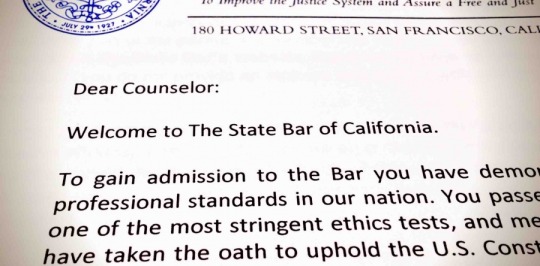57.3%
Last August, Jon Hanson asked me, as an alum, to give a talk to a group of Harvard Law School 1Ls about “life in the law.” It was one of the hardest talks I’ve ever given, because it’s some of the subject matter that’s still the rawest for me. It’s been sitting on my hard drive for a while, and although it fills me with anxiety, I figure it’s long past time I share it publicly.

In November 2016, I was sitting in a hotel room in Pittsburgh and I had just found out that I failed the California bar, just like 57.3% of other people who took it.
Alex, one of my best friends from law school, and I took the bar together. Among 1500 test takers in Sacramento, California, we were randomly placed two seats apart. I’m on the phone with her when we get our results. She’s convinced that the computer system failed, that there’d been some sort of mistake. After all, she walked out halfway through the first session (leaving me panicking on her behalf in the test room), and she’s passed. Her faith in my ability to make up California law on the spot was touching, but I knew that if I’d failed, I’d deserve it. I hadn’t studied hard enough. I had been convinced that adrenaline would pull me through on the day of–but the reality is that relying on sheer willpower is a bad strategy for closed-book high-stakes testing.
I’m not the only one who has failed the California bar. Every year, Above the Law publishes a list: Hillary Clinton, Michelle Obama, Kamala Harris, Kathleen Sullivan. Ridiculously successful people who were probably too busy doing useful things rather than studying for the test.
So back to Pittsburgh. Alex stayed on the phone with me, as I typed my exam number in again and again. She’s sure something went wrong. I’m sure California’s 42.7% pass rate had caught up with me. The next day, another friend posted about her bar experience on Facebook. She wrote: “…You only fail if you give up so maybe I won’t say I failed but I also did not pass the California bar exam. Since Friday, I’ve been waiting for the tears to come. I’ve been waiting for devastation or anger. But it’s Monday, and that hasn’t happened.”
I wasn’t brave like her. I kept silent publicly, and I cried privately. I avoided questions about it, and as the exam where I would retake it approached, I got the bar exam mansplained to me because I didn’t want to admit I’d already taken it and failed. I was convinced that all of my successes would be erased if people found out I failed the bar. That bar failure revealed the truth of who I was.
To be charitable to myself, there is a reason. Law is a status-driven profession. It would be foolish to tell you otherwise. It would be a lie to tell you that Harvard Law School does not open doors for you or that the right words on your resume will not get you at least an interview. My worry was at least justifiable, if not excused. (That’s a criminal law joke, you’ll get it after next semester.) I worried ceaselessly, for months, about what would the words “pending admission to the California bar” would do to me.
It is all too easy to believe that what you do is who you are. That success is measured in acceptances, grades, study group invitations, and the law review competition. But Harvard attendance does not make you a better person. Depending upon your resume and test scores to define your self-worth will lead to crying by yourself in a hotel room, ashamed to admit to your boss that you failed a fucking standardized test.
Instead, I recommend you try your best to reject the idea that your successes will determine your value as a person. What I try to tell myself is that failing to pass the bar the first time doesn’t diminish me, doesn’t make me worth less because my worth does not come from my ability to overcome the hurdles of our profession. I fail at convincing myself of this a lot. But I still try.
So I’ll say it to you: you cannot control what other people do, where the curve falls, or what California’s cut score is. So do not make your own care for yourself contingent upon it. You do not deserve respect or care because you will someday pass the bar, or because you may get good grades, or even because you are in the best section. You deserve respect, kindness, and care because you are a person. Your value does not come from your ability to be a lawyer.
When I contemplate lessons I have learned about the law, I wish someone had told me that no matter how well you do in law school, or in life, tying your self-worth to how well your accomplishments stack up to other people’s expectations sets an impossible standard that you will do yourself harm trying to reach. And also, the California bar is not that easy, so you might want to buy some flashcards.